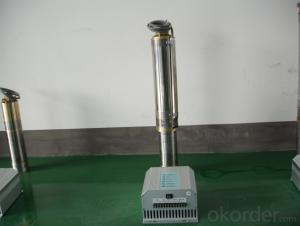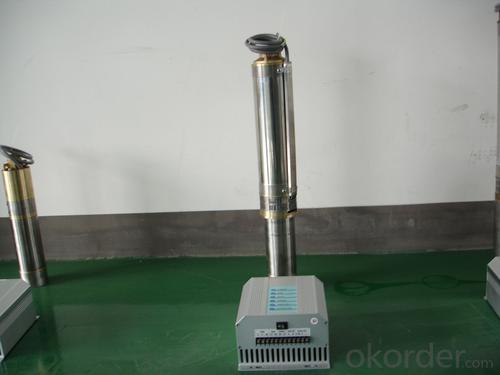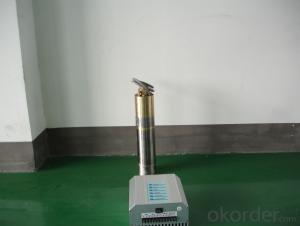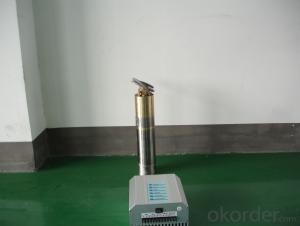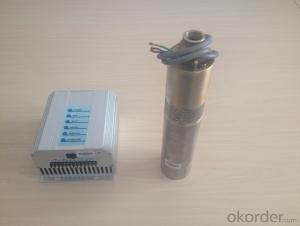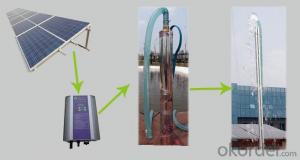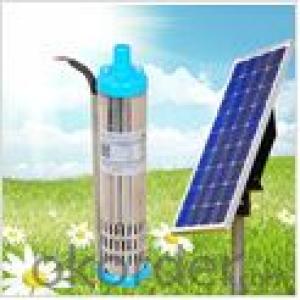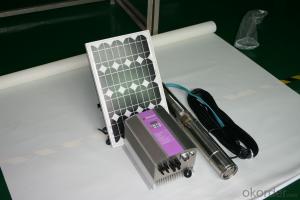Solar Pump Philippines DC Submersible Solar Pump
- Loading Port:
- China Main Port
- Payment Terms:
- TT OR LC
- Min Order Qty:
- -
- Supply Capability:
- -
OKorder Service Pledge
OKorder Financial Service
You Might Also Like
Item Description :
This superb new addition to our solar fountain range comes with a 10w solar panel,and a powerful fountain pump that is capable of producing fountains of up to 2m in height. As well as being easy to set up and use.Instruction manual is supplied for assembly and maintenance.
Solar Fountain Key Features :
Powered by direct sunlight
No high voltage electric mains required
Safe for children
Max. height of fountain: 2M
Max. flow capacity: 800 L/H(176 GAL)
10W Polycrystalline solar panel included
18V DC brushless pump
Solar Pump Features :
Can produce fountains up to : 2M (tube height) 1.4M (fountain height)
Comes with multiple nozzle accessories
Cable Length : 5M
Solar Panel Features :
10W peak power.
Polycrystalline highly efficient solar panel
Comes mounted in aluminium frame
Comes with ground stake and rotating knob so you can angle your panel toward the sun
What You Will Get :
10W solar panel
Solar pump
Ground Sake
Nozzle accessories
Precautions :
DO NOT alter or change the product itself or its components
Operate pump in freshwater only, never above 50 degrees celsius
Keep away from flammable liquids
Do not connect to any other power supply other than the included
- Q: Can solar pumps be used for water supply in vineyards or wineries?
- Yes, solar pumps can be used for water supply in vineyards or wineries. Solar pumps are an efficient and sustainable solution for pumping water, making them a suitable choice for agricultural applications such as vineyards and wineries. They can help reduce energy costs, decrease dependence on fossil fuels, and provide a reliable water supply for irrigation and other purposes in these settings.
- Q: Can a solar pump be used in remote locations without access to electricity?
- Yes, a solar pump can be used in remote locations without access to electricity. Solar pumps are designed to operate using solar panels and do not require a direct connection to the electrical grid. By harnessing solar energy and converting it into electricity, solar pumps can provide a reliable and sustainable water pumping solution in off-grid areas.
- Q: Can a solar pump be used for water supply in public parks or recreational areas?
- Certainly, water supply in public parks or recreational areas can be achieved using a solar pump. Solar pumps present a sustainable and environmentally friendly option for pumping water by harnessing the energy of the sun to power the pump. They prove to be highly advantageous in areas where electricity access may be limited or unreliable. Solar pumps can be employed to extract water from nearby sources like ponds, lakes, or underground wells. This water can then be distributed to public park features such as fountains, sprinkler systems, or other water elements. Moreover, these pumps can also fill up water tanks that can be distributed throughout the park for various purposes, including irrigation, drinking water supply, and recreational water activities. Utilizing solar pumps for water supply in public parks comes with significant benefits. Notably, these pumps operate silently and emit zero emissions, thereby creating a peaceful and clean environment. Additionally, solar pumps necessitate minimal maintenance, resulting in reduced overall operating costs and making them a cost-effective option in the long term. In summary, solar pumps offer an efficient and sustainable solution for water supply in public parks or recreational areas. They ensure a constant and reliable water source while minimizing the adverse impact on the environment.
- Q: Do solar pumps require maintenance?
- Yes, solar pumps do require some maintenance. Regular maintenance tasks may include cleaning the solar panels to ensure optimal energy production, checking and cleaning the pump's intake screen or filter, inspecting and tightening connections, and occasionally replacing worn-out parts. However, compared to traditional pumps, solar pumps generally require less maintenance due to their simpler design and fewer mechanical components.
- Q: Can a solar pump be used in areas with extreme temperatures?
- Yes, solar pumps can be used in areas with extreme temperatures. However, the performance and efficiency of the pump may be affected by the temperature extremes. It is important to select a solar pump that is specifically designed to withstand and operate in extreme temperatures to ensure reliable and efficient operation.
- Q: Can a solar pump be used for water supply in parks or recreational areas?
- Yes, a solar pump can definitely be used for water supply in parks or recreational areas. Solar pumps are a sustainable and environmentally friendly option for water supply as they utilize solar energy to operate. They do not require grid electricity or fuel to run, making them cost-effective and reducing the carbon footprint. Solar pumps can be used to pump water from a source like a well, pond, or river and distribute it throughout the park or recreational area for various purposes, including irrigation, drinking water fountains, decorative water features, and even for filling up swimming pools or water play areas. They can be easily installed and require minimal maintenance, making them an ideal choice for parks and recreational areas where a reliable and efficient water supply is essential.
- Q: What is the maximum pumping capacity of a solar pump?
- The maximum pumping capacity of a solar pump can vary depending on the specific model and factors such as sunlight intensity and water source. However, solar pumps typically have a maximum pumping capacity ranging from a few hundred liters per hour to several thousand liters per hour.
- Q: Can a solar pump be used for water supply in arid or desert regions?
- Yes, a solar pump can be used for water supply in arid or desert regions. Solar pumps are especially suitable for these regions due to their reliance on solar energy, which is abundant in such areas. Solar pumps work by converting sunlight into electricity, which powers the pump to extract water from underground sources or other water bodies. This makes them a sustainable and cost-effective solution for water supply in arid or desert regions where traditional electricity supply may be unreliable or non-existent. Additionally, solar pumps are often designed to be low-maintenance and durable, making them well-suited for the harsh conditions typically found in these regions. By harnessing the power of the sun, solar pumps can provide a reliable source of water to meet the needs of communities, agriculture, and other applications in arid or desert regions.
- Q: How does a solar pump handle water source contamination from oil drilling activities?
- A solar pump does not directly handle water source contamination from oil drilling activities. However, it can be used to pump water from alternative clean sources, reducing the reliance on contaminated water sources and mitigating the potential impact of oil drilling activities on the water supply.
- Q: Can solar pumps be used for water supply in remote educational institutions or schools?
- Yes, solar pumps can be used for water supply in remote educational institutions or schools. Solar pumps are an excellent solution for remote areas where access to electricity is limited. They utilize solar energy to power the pump, making them cost-effective and environmentally friendly. Additionally, solar pumps require minimal maintenance and have a long lifespan, making them a reliable option for providing water supply to educational institutions in remote locations.
Send your message to us
Solar Pump Philippines DC Submersible Solar Pump
- Loading Port:
- China Main Port
- Payment Terms:
- TT OR LC
- Min Order Qty:
- -
- Supply Capability:
- -
OKorder Service Pledge
OKorder Financial Service
Similar products
Hot products
Hot Searches
Related keywords
